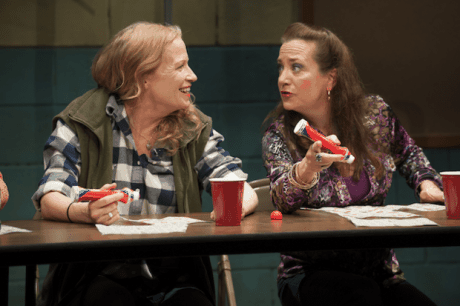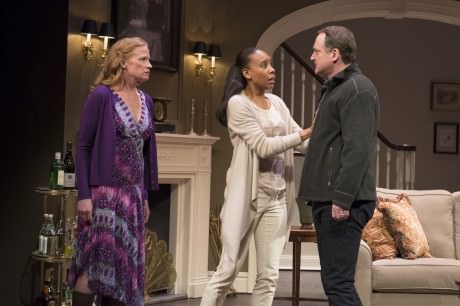Arena Stage Makes Good People Great
The pivotal character in David Lindsay-Abaire’s new play Good People, directed at Arena Stage by Jackie Maxwell, has no lines and never comes onstage. All she does is fiddle with the TV in a room behind the kitchen, sometimes turning up the volume until it’s so loud that we can’t hear the characters who do have lines. When that happens, her mother, Margie, has to interrupt her train of thought, get up from the table, and leave the stage to turn the volume down. Her friends wait for the noise to stop, exchanging looks that show how often this has happened. When she comes back, the train of thought is gone.

That off-stage character is the symbol of our prematurity, I thought, which is the same thing as our immaturity, which has consequences that can shape your life. But I was wrong about that: she’s not a symbol, she’s a child. You don’t get those narrow eyes and hollow cheeks by raising symbols.
Margie’s child is 26 years-old. Her name is Joyce, which sounds like what you ought to call the circumstance that follows joy. Her mother claims that she was born prematurely, and that’s why she’s retarded, which is probably a lie, the only lie Margie tells in the entire play. It costs her dearly, so you have to wonder why she doesn’t tell the truth. At first I think the answer is pride, and later I think generosity, but in the end I think she lies to change the story of her life.
I do that every day.
The play appears to be a series of assaults on Margie’s pride, almost an experiment in Naturalism: what might we see this woman do if we eliminate her self-respect? In the first scene she begs Stevie not to fire her for being late again. She had to wait for Dottie to show up to sit with Joyce, Margie explains. That happens a lot, but she can’t hire a real sitter and she can’t leave Joyce alone, so what’s she supposed to do?
“Cut my pay,” she begs. “I knew you’d start looking for an excuse when I went over nine dollars an hour.”
The issue isn’t money, Stevie explains; it’s reliability: Margie can’t be both a reliable mother and a reliable cashier.
“I’ll work for eight fifteen an hour,” Margie offers, “like I did when I first started.”
Those fifteen cents must be especially humiliating.
Johanna Day, who plays Margie, looks like Jennifer Lawrence might look if she’d slept with that boy in The Hunger Games and then spent 25 years trying to find potatoes for his baby. She has the wiry resilience of a scavenger who’s learned to take her pleasures where she can — a game of bingo, her friend Jean’s cigarette, the way it feels to touch her hand each time they pass it back and forth.
“You’re too nice,” Jean says. “That’s why you have nothing.”
Nothing but the extraordinary connection that develops among people who have nothing but each other all their lives.
Jean has recently run into Mikey Dillon, Margie’s old boyfriend, who once had nothing but now has a successful fertility clinic. Jean thinks Margie ought to ask him for a job. He was good people, Mikey Dillon, and he owes her that much, doesn’t he? Maybe so, but no one should be forced to approach a former lover for employment.
“Remember how pretty I was?” she asks him at one point. “You thought I was so pretty. That was all it took for me to like you back.”
Andrew Long, who plays Mike, runs through several layers of emotion in the first two minutes of reunion with the girl he left behind: he’s proud, nostalgic, offended, embarrassed, and sorry, almost from one sentence to the next. By minute three, she’s got him back in the old neighborhood again, South Boston, in spite of all his effort to get out, and they begin to push and slap each other into circumstances only one of them is likely to survive.
But you never get really get away from Southie, not in this production. Set Designer Todd Rosenthal puts two clapboard buildings on the stage that lean precipitously toward each other in a way that begs for metaphorical interpretation: as if they were listening to each other, as if they had weak knees, as if they were magnets, exerting the same kind of pull on each other as they exert on the people fate delivers to them. I thought they’d be yanked into the fly space after the first scene, which is the only one that takes place in the alley, but instead of pulling the buildings, Rosenthal wheels Margie’s kitchen out and parks it on the asphalt apron. Then he wheels out the bingo parlor, and the doctor’s office, and the fancy living room in Chestnut Hill where Mike and his wife had planned to host a cocktail party. Through each of those changes, Lighting Designer Michael Gilliam keeps those buildings lit so we can see them, looming up and pressing on us everywhere we go. They make everything look crooked.
“Southies resent the people who get out,” my friend Sheila explained. “They see escape as betrayal.” Sheila grew up in Southie and got out the same way Mike did, through education, which is also how playwright David Lindsay-Abaire got out.
“I’m a reproductive endocrinologist,” Mike tells Margie when she shows up in his office. She claims not to recognize those words because she only went to Southie High.
“So did I,” he says, in a tone that tells her ‘only going to Southie’ isn’t an excuse for making nothing of herself. “I went to Southie High, too.”
And from there to U Penn, Margie reminds him, and from there to med school, and from there to Chestnut Hill. “You’re rich now,” Margie says.
“I’m comfortable,” he answers.
“That makes me uncomfortable, I guess,” she says.
Which makes him uncomfortable, too, because he’s supposed to be good people, not the kind of guy who lords it over friends who didn’t make it out. Especially girlfriends. Especially the girl who gave herself to him before he left, when nobody was watching.
Which brings us back to Joyce, the circumstance that follows joy, who will never leave the neighborhood or want to leave. She’s the reason Margie takes the T to Chestnut Hill and rings the doorbell of a house that might have been hers, where the man who might have been her husband now lives with a woman who can name a dozen different kinds of cheese, a woman to whom Margie tells a lie during a harrowing argument, which is either that Mike is probably Joyce’s father or that he isn’t.

(L to R) Johanna Day (Margie), Francesca Choy-Kee (Kate), and Andrew Long (Mike). Photo by Margot Schulman.
“I would have left no matter what,” Mike says. “You didn’t make it possible for me to go.”
Margie knows that’s probably the truth, but it’s a kind of truth that no one is required to believe.
Maybe Margie doesn’t get to choose whether to stay in Southie or to go, but she gets to choose how she thinks about staying, and how she thinks about herself.
The genius of Good People is that it makes her lose – and lets her tell herself that she has won. What more can any of us ask of life, or of theater?
Arena Stage Makes Good People great.
Running Time: Approximately two hours and ten minutes, including one intermission.
Good People plays through March 10, 2013 at Arena Stage at the Mead Center for American Theater – 1101 Sixth St., SW, Washington, DC. For tickets, call the box office at (202) 488-3300, or purchase them online.




